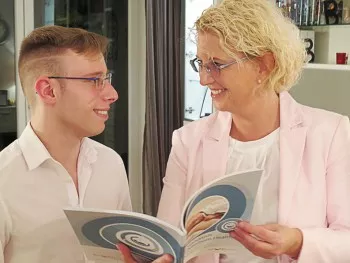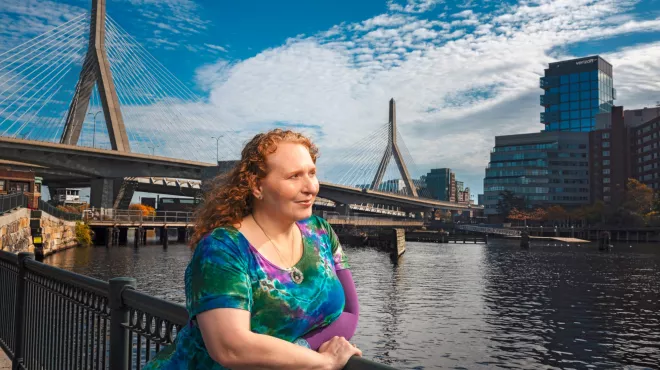For some people, experiences of profound hardship can be the beginning of the end. Others do their best to cope and move on. A small percentage of people take their difficult experience and use it to change the world. Silke Mader, Chairwoman and co-founder of the European Foundation for the Care of Newborn Infants (EFCNI), is one such person.
Twenty-two years ago, Ms. Mader gave birth to twins, a boy and a girl, at only 25 weeks. Her baby girl died but her son Lukas survived, and was admitted to the neonatology intensive care unit, where he had to stay for several months. One consequence of Lukas’ preterm birth was that he developed retinopathy of prematurity (ROP), a disease involving abnormal blood vessel growth that can, if not treated, lead to blindness. At that time, the only treatment available for ROP was laser therapy, a procedure that uses a beam of light to burn, then scar, the area where abnormal blood vessels have not yet reached. Additionally, the brief medical information that was shared with Ms. Mader was incomplete and there was no recognition of the need for psychological support for parents of preterm infants.
Dealing with that very difficult experience encouraged Ms. Mader to take action. In 2008, together with a father who had lost triplets born preterm, and a neonatologist, she founded the European Foundation for the Care of Newborn Infants (EFCNI) to raise the standard of care for preterm babies and to ensure that Europe—and ultimately the world—adopts and harmonizes standards of care to protect and support preterm babies as well as their families. The same year it was founded, EFCNI introduced World Prematurity Day. Today, World Prematurity Day, which takes place on 17 November, is one of the most important days in the year to raise awareness of the challenges and burden of preterm birth globally and is celebrated in more than 100 countries as a way for individuals, healthcare institutions and NGOs to join forces and commit to action to help address preterm birth.

In 2015, Ms. Mader was elected to become an Ashoka Fellow, a distinguished honor reserved for the world’s leading social entrepreneurs whose ideas have transformed society. In 2016 she received the Bavarian State Medal for Services concerning Health and Long-term Care. She is the co-editor of the EFCNI benchmarking report “Too little, too late? Why Europe should do more for preterm infants”, as well as “Caring for tomorrow,” an EFCNI whitepaper on maternal and newborn health and aftercare services, and technical editor of the “Born too soon” global action report on preterm birth as well as the latest WHO/Unicef report “Survive and thrive – transforming care for every small and sick newborn.”
“Preterm birth is not a marginal phenomenon; babies born too early represent up to 10% of births in Europe,” Ms. Mader said in the EFCNI press release announcing the award. Indeed, complications resulting from preterm birth can impact a baby’s breathing, heart and brain functions, blood and metabolism, temperature control, immune system and more. “These children and their parents receive too little political support and above all, they lack the backing in society. That is something we want to change.”
Thanks to the efforts of Ms. Mader and EFCNI, parents of babies born at risk for ROP today have a very different experience than she did. (Ms. Mader’s own son Lukas is doing well, studying sociology at university and managing his ROP with regular medical care.) Watch this video of parents in a neonatology intensive care unit for a glimpse of the medical care that Ms. Mader’s advocacy work has helped to achieve.
We spoke with Ms. Mader about her personal experiences back then, her vision for the future, and her advice for parents of preterm infants today.
Describe the moment you learned that one of your twin preterm infants had ROP. How was the news shared with you?
I have a very dark memory about that day, and I will never ever forget it. It was just two weeks before Lukas’ discharge that a very young neonatologist loudly shouted down the corridor that he had forgotten to tell me something. “By the way, Lukas has been diagnosed with ROP – he will not be blind if it does not get worse in the next days and weeks, and ROP is not really dangerous, but he needs to have follow-up checks for his eyes from now until he is two, or even better to six years old to prevent any long-term consequences.”
Feeling helpless and seeing my baby suffering in pain all while being full of fear that maybe he will become blind; that mixture of roller-coaster feelings continued for more than six years.
Silke Mader, mother of a son who has retinopathy of prematurity (ROP)
Immediately after that statement, he left me there standing alone in the corridor. I am still overwhelmed when I share this story with you now. It is an example how parents should not be treated.
What information do you wish had been shared with you to help you cope with your experience of ROP?
I want to emphasize the need of sharing information as early as possible about the risk of ROP. Diagnosis and information about ROP are usually given quite late; it can sometimes be shortly before someone’s hospital discharge. So my recommendation is to provide early and transparent information to parents, inform them in a respectful and understandable way while respecting their privacy. We should also support parents during screening, treatment and follow-up for ROP.
What would you say to a new parent who is going through this experience?
I hope that they will get the information in a different way than I did; they will hopefully be informed properly with a competent leaflet, or information they can read. I would also recommend for parents to attend the screening and check-up appointments to support their baby. It’s important to take all these assessments and follow-up appointments seriously.
Is there anything else we should know about the experience of a child and/or parent of a baby with ROP?
The most important thing is the long-term follow-up of all children with ROP, regardless of their level of ROP.
I’d like to stress the psychological burden that parents experience and the relationship between the baby and the parent, especially at the beginning of parenthood when parents are bonding with their baby. Even today, I would not underestimate this after all these years doing this work.
For support and more information, parents of preterm infants should ask their hospital team if resources are available. And they can visit https://www.efcni.org/
Learn how the mother of a baby with #ROP used her experience to advocate for parents #WorldPrematurityDay



